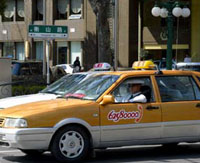
China's largest city Shanghai has raised taxi fares by 6.7 percent to offset the rising fuel costs.
Starting on Thursday, the city will raise taxi fares from 2 yuan (US$0.25) per km to 2.1 yuan (US$0.26), according to a joint circular issued by Shanghai Municipal Reform and Development Committee and Shanghai Municipal Communications Bureau on Wednesday.
Charges for the first three kilometers will be increased from 10 yuan (US$1.25) to 11 yuan (US$1.38), the circular said.
The price hike, which averages 6.7 percent, was decided upon following a public hearing held by the city's price bureau on April 17, the local government said.
As part of a government plan to ease the impact of costlier oil on cab drivers and taxi companies, the price hike will help each taxi earn an additional 1,400 yuan (US$175) every month.
Besides the taxi fare rise, the Shanghai government has also lowered the rental fee, which is paid by contracted cab drivers to taxi companies on a monthly basis, to 9,500 yuan (US$1,187.5) a month from 9,800 (US$1,225) or even 10,000 yuan (US$1,250).
Following the price hike, however, a gasoline subsidy which averages 820 yuan (US$102.5 a month for each taxi, will be cut out in June. The subsidy, funded jointly by the local government and taxi companies, was introduced in August 2005 to help ease the pressure of climbing oil prices on taxi drivers.
Taxi plays a vital role in Shanghai's road transport sector as its 43,000 taxies, shared among 100,000 drivers, carry three million passengers a day, or a quarter of the daily passenger traffic within the city.
The national capital Beijing is also considering a 25-percent hike in taxi fares, though many cabbies fear this may drive away many passengers and eventually cause income declines.
(Xinhua News Agency May 11, 2006)
|

